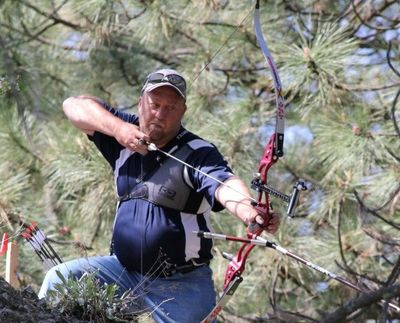Spokane archer represents USA

A Spokane archer followed a family tradition of arrowing his way into the spotlight this summer.
Wyndell Wilhelm, 46, outshot competitors from around the country in May at the USA Archery Field Championships and World Team Trials held at Evergreen Archery in Spokane.
That was his ticket to France, where he competed in August against some the world’s best archers in the World Field Championships held somewhere in the globe every two years.
He was among 33 team members representing USA in compound, recurve and barebow categories, each of which had men, women, junior and team divisions.
Some of this year’s World Championships competitors had just competed the previous week at the Olympic Games in London.
“It’s no exaggeration that the competition was stiff,” Wilhelm said. “Jake Kaminski, the American who won a silver medal in London, won a gold and a silver medal (in the recurve category) at the World Championships in Val d’Isere.
“It was the real deal.”
But field archery is much different than the Olympic competition – set on a flat 70-meter range – that captivated millions of TV viewers.
“Field archery is much more interesting to me because you move around to different situations much like golfers on a golf course,” he said.
The variable terrain simulates hunting.
But while many archers with his skills were gearing up in August for bagging an elk or deer, Wilhelm, a non-hunter, was shooting for gold.
Field competitors must shoot uphill, downhill and sidehill at targets 10-60 meters away.
“Wind’s a variable, and usually the distances aren’t marked, throwing another factor into the equation,” he said.
If he estimates a target at 20 meters, but it’s downhill, he may shoot for 19 meters in order to compensate for the angle and hit the bull’s-eye, he said, making a reference to the geometry: “Think of a right triangle, shooting the base not the hypotenuse.”
Wilhelm, an accountant, seems to have the calculating mind and calm disposition that fits the sport.
He also has the lineage.
His father, Walt, and grandfather, Ken Wilhelm, were professional archers who performed stunts in film shorts and shows in Spokane and across the country.
“They’re most famous for shooting apples off their heads,” he said. “My brother, Wesley, shoots, too. When we went to our grandfather’s ranch, we always shot bows and arrows.”
Wilhelm didn’t make the podium in France, but he relished the experience of being on the same field with several Olympic medalists.
“There were a few differences,” he said. “First and most obvious was language. Most of the archers I shot with spoke a bit of English, but all of them knew English numbers. Scoring, calling the arrow values and writing them on the score card, took longer than normal, but it all worked out fairly smoothly.
“The biggest difference was that the pace of shooting was much slower. It took 61/2 hours to complete my first round in France. By comparison, it would take roughly 4 hours to complete the same round in the States. The slower pace was a challenge for me. I like to play ‘ready golf’ when I shoot field archery, but I think slow and laid back is the norm in Europe, where the sport is much more popular.”